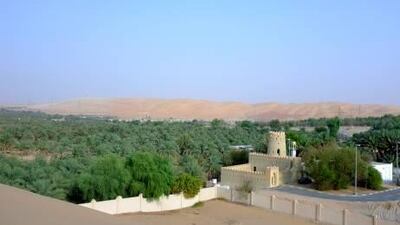LIWA // Farmers feed the city but someone has to feed the farmers.
For the month of Ramadan, that someone is Saleh Mohammed, along with his friends at the Hamil bin Ghait Al Qubaisi Mosque.
Sitting between the sculpted dunes of the Qatuf village, the mosque is a haven of spirituality and friendship for the farmers of the Liwa Oasis.
The imam, Sheikh Mohammed Abu Saad, explains: "Not all places are the same but this place is as blessed as any other."
Mr Mohammed, 54, lives in a prefabricated plywood cabin behind the mosque with his friend, Mohammed Mumtaz.
They believe their lives are rich and seek to share their blessings with others by uniting the community of Liwa at their mosque during the month of Ramadan.
Mr Mohammed, the self-proclaimed "boss of 200 palms", has worked here for 35 years.
He started when the mosque and his beard were new. Now, his beard is a soft white with a hint of yellow at its tip, the last of his efforts to hide his age by dyeing his beard orange with henna leaves.
"White is number one," says Mr Mohammed. "I'm an old man - khalas. An old man!"
He has the patience of age but the energy of youth.
He tends to the trees with his friends from 6am until 11am. But during Ramadan, his most important work only begins after the afternoon asr prayers: that of head cook.
After praying, Mr Mohammed leaves the cool of the mosque for an adjacent villa where the charity taught by Sheikh Abu Saad is put into practice.
The villa belongs to Khalfan bin Humaid Al Qubaisi, a man of about 70 who is the patron of the mosque and the great iftar feasts served at the farm beside it.
With his ghutra wrapped tightly around his face as protection against frying onions, Mr Mohammed springs around the kitchen, tossing tomatoes, potatoes, spiced chicken and rice into a cauldron.
The biryani is ready within an hour. Men arrive by lorry and quad bike from villages that dot the edge of the Saudi Arabian border for takeaway parcels.
The fame of this mosque hidden by palms has spread throughout the oasis since the tradition began seven years ago.
"All Liwa knows this place, the farmers all know it. We hear about it every day," says Amin Allah, a lorry driver from Pakistan.
Farmers arrive on foot with the final rays of sunset.
Dressed in their best plaid wraps and sequinned caps, they remove their sandals, seat themselves on the Persian carpets and wait for the call to prayer to sound over the dunes - a satellite broadcast from Madinat Zayed.
Men break their fast with dates harvested from the trees above and Mr Mohammed pauses for a minute before he rushes off to ensure the farmers have a quick cup of tea before maghrib prayers.
He hurries back from the mosque after prayer to sweep the kitchen floor and then starts to scoop out platters of biryani for the great feast ahead.
Once all have emptied their platters of biryani and buckets of hibiscus juice, Mr Mohammed has a final job ahead - to make sure each man leaves with the right shoes. There are so many men with black sandals that this can prove an enormous task.
"When everyone's finished, then I eat," said Mr Mohammed. "I don't need to eat if I'm working. I had some dates and water."
In this way, he and his friends serve the mosque and his community in the true spirit of Ramadan.

